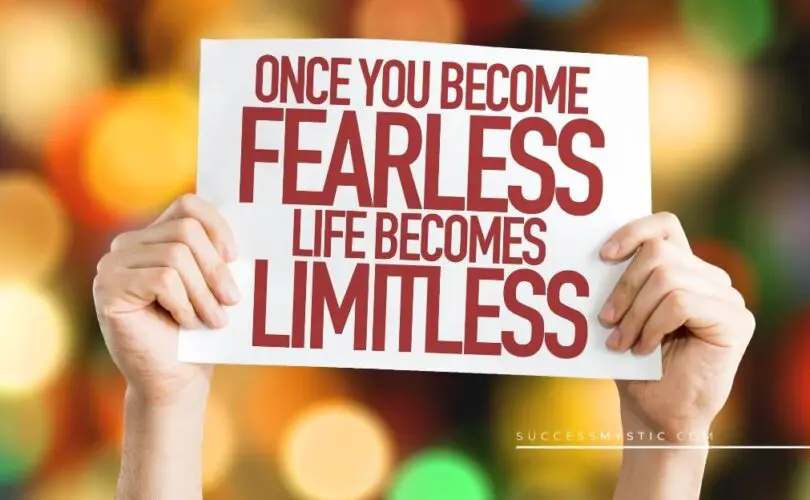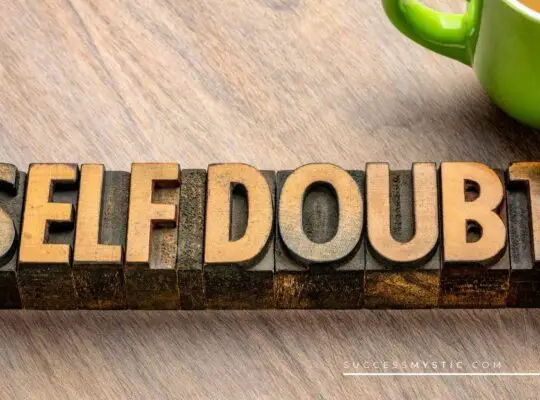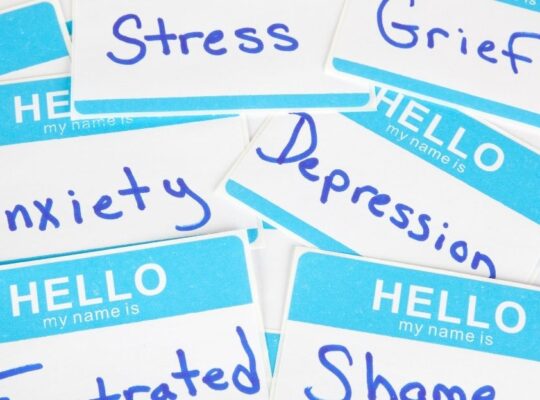In this article: How fearless thinking and action benefits you and improves your life!
What comes to your mind when you hear that word?
Most people equate courage with fearlessness. That’s not strictly true, though. True courage is acting despite the fear you feel. It’s acting and thinking fearlessly, even though you feel that fear deeply.
If you let it fear will paralyze you. It will stop you in your tracks and prevent you from moving forward. You may think of people who act and think fearlessly as reckless. The reality of the matter is that this type of action and thinking benefits you. Acting with courage benefits you. Thinking with courage benefits you.
The people who live a life of courage grab the opportunities that come their way. The people who live a life of courage chase down their dreams and they get what they want from life. They are capable of building the life they have always dreamed of because they don’t let fear stand in their way.
So, now what comes to your mind when you hear the word courage?
Do you live your life fearlessly or have you been allowing fear to hold you back?
Do you worry that you’re not confident enough?
It’s a virtue, one that has been written about since humans created a written language.
Nelson Mandela said, “I learned that courage was not the absence of fear, but the triumph over it.”
The courageous stand against injustice, whether it’s a threat against them, someone they care about or, someone in need. The courageous are willing to take actions that consistently align with their values. That action isn’t always loud or in your face, sometimes it’s thoughtful, subtle, and quiet.
As Winston Churchill said, “Courage is what it takes to stand up and speak; courage is also what it takes to sit down and listen.’
While some people are fooled into believing that every act of courage is a risk, that isn’t the case. It may feel as though it’s a risk because you battle fear as you attempt to put your courage into action. However, every action stems from though. Being courageous isn’t about rushing in blindly. It’s about thinking things through and acting despite the fear that sets in.
Courage is Beneficial
You may not think about it like this but acting with courage makes you feel good. Part of the process is learning to master your emotions and when you learn to do that you will feel better about life. It’s as simple as that.
When you think about it, it makes perfect sense. The fact that humans celebrate acts of courage should show us how positively we view it. It isn’t about being overconfident, it isn’t about being a coward, courage helps us appropriately respond to risk and accomplish positive things.
Moreover, courage helps you to act when under threat. It takes courage to act bravely in the face of danger.
An excellent example of this would be Robert Falcon Scott. The former Royal Navy Officer led two Antarctic expeditions. The first was of discovery in 1901. His final expedition, 1910-1913, resulted in his death. His mission was to reach the South Pole.
He did so, unfortunately, he and his team were beaten by Roald Amundsen’s Norwegian expedition team. Even more unfortunately, he and his entire team died on the return leg (ref.).
This doesn’t feel like a very good example, does it? Bear with me. They didn’t quite achieve the ultimate goal, but they acted with unmistakable courage. The team was aware of the risks. They had been on a three-year expedition in 1901 and failed. They still chose to try again, they went on the expedition, and they acted courageously in the face of risk.
While they were not around to see it – they were celebrated throughout the United Kingdom. Even after his first failed expedition, he was lauded. Today, there are monuments all over the UK celebrating his life and legacy. His courage was his undoing, but he acted despite the risks and fear he faced.
Overcome Fear With Courage
We view fear as a negative. We view overconfidence as arrogance, it’s a negative. Both of these things make us feel bad, whether it’s in the moment or later.
Yet, fear is necessary for survival.
We fear things that we feel threaten our survival. Unfortunately, our fight or flight response often kicks in when it’s unnecessary. Your palms grow sweaty, your body runs cold and clammy, your teeth chatter, you tremble, shiver, and experience butterflies.
When you experience fear your body and brain are telling you that you may not survive this. Unfortunately, that response isn’t always rational. That leftover response from evolution leaves us riddled with anxiety at the most innocent of times.
You’re not running from wild animals trying to eat you, you’re just trying to get through an interview. You aren’t battling a predator; you’re navigating a date. It isn’t life or death, but it feels like it is.
You can navigate the fear by playing a game of questions
- What is the worst that could happen?
- What is it that I’m afraid of?
- Am I afraid of something I should be afraid of?
- Is my fear rational?
- What harm does this threat or risk present to me?
- If I choose not to act, what could happen?
- If I choose to act, what could happen?
- What is the worst-case scenario if I do or do not act in this situation?
- What risk does this pose to me?
- What risk does this pose to others?
Courage provides you with the strength you need to evaluate your emotional response to ensure you act rationally.
Confidence is a positive trait. It gives you the power to act, to believe in yourself, to chase your convictions. There is a difference between it and over-confidence, though. Over-confidence makes you too ready. It makes you more likely to take unnecessary risks.
It’s more difficult to identify over-confidence than it is to find the fear because over-confidence feels positive. It feels just as good as confidence. We often don’t realize it’s over-confidence until it’s far too late. Over-confidence means you don’t feel the fear because you failed to evaluate the risks properly.
If you’re worried that you have an over-confidence problem, then question yourself.
- What can you achieve?
- How can you make a difference?
- How can you be sure that your actions will have an impact?
- How can you be sure that you’re not doing harm?
Be realistic and rational as you answer these questions. Drop the bravado, this is about evaluating whether you feel confident or if you’re slipping into over-confidence.
The point being over-confidence and fear are just two sides of the same coin. Both of these prevent you from acting courageously when the time comes. It’s important that you know which of these issues is causing your courage problem. They are both a weakness that you need to overcome.
11 Proven Ways To Develop Courage
If you veer towards fear, you have a lot of work to do in building your confidence. If you stray towards over-confidence, then you need to learn how to appropriately assess dangers and risks when faced with difficult situations.
Courage is about doing the right thing regardless of what stands in your way. So, how can you build courage?
1| Identify the Fear
It’s difficult to develop courage when you haven’t inoculated yourself against your specific fears. You may be reluctant to admit you have fears, but you have to confront them to prevent them from undermining your courage.
So, take a deep dive into your psyche and write out a list of your specific fears. If you struggle to complete this exercise, think back to moments when you felt ashamed by your lack of action. Or, something that you felt embarrassed by when faced with.
2| Determine the Cause
Once you have identified your fears, you can work on figuring out why you possess these specific fears. It might be a memory that haunts you or an experience you’ve been through that has instilled this fear in you. It might even be something that happened to someone else that has caused your fear. By identifying and determining the cause of your fears, you can begin to take steps to alter your behavior and develop a sense of courage.
Think of specific experiences that contribute or have contributed to your confidence problem. Determine how you can counter them with positivity. As an example, you are hesitant to invite someone out for coffee because the last time you did so they rejected you. Don’t focus on the rejection, focus on the many times someone has accepted your invitation.
3| Recognize Courage
Recognizing your courage is just as important as identifying your fears. You have the courage within you, whether you realize it or not. We all possess courage, yours might just be hidden. Think back on your life and try to find all of the times you acted with courage.
You did it then, you can do it now.
4| Develop a Plan
When you have a list of fears and situations you show courage in, then you can develop a plan to build your courage. A clear action plan will help you develop courage. Write out an action plan and update it as you need to.
You should have a concrete list that will motivate you. For example, if you are afraid of driving downtown, create a plan that will help you become accustomed to doing so until you can finally do it on your own. It might be that you regularly sit in the passenger seat as a friend navigates the busy one-way streets of the city before attempting it yourself.
5| Scripted Situations
Facing your fears can make you lose confidence. When this happens, we often avoid those situations for fear it will further dash our confidence even further. Do you know how you can flip the script? By literally scripting the situations that trigger your fears.
Scripting is simply creating a game plan for a situation and then following through on it. For example, if you want to ask for a raise, but you’re too afraid to ask… then make notes and create a plan that will instill you with confidence.
This process will allow you to create a variety of contingency plans depending on how your boss responds. You can do this for just about any situation where fear resides.
6| Keep it Simple
Try to frame your fears in the simplest terms possible. This technique helps you shape exactly how you feel and think about a situation. It frames them as commonplace and allows you to change your thinking.
So, if your greatest fear is snakes because a rattlesnake is poisonous, remind yourself how rare it is to run into one and how they don’t like you either. Rattlesnakes keep to themselves, they rattle as a warning, and there are steps you can take to deal with them if you do live in an area where they frequent.
7| Don’t Make Comparisons
We are all guilty of comparing ourselves to others, don’t allow yourself to get caught up in this habit. It minimizes your confidence. Focus on you.
8| Embrace the Positive
Do you know what negativity does to you? It drains your energy. When you allow negativity to take root within you, it becomes stronger, it undermines your confidence and impacts your ability to act with courage. In every situation, seek out the positive. It will help you build confidence and develop courage.
9| Accept Failure, Take Risks
One of the greatest drivers of fear is failure. We refuse to act with courage because we fear that we will fail. Be honest with yourself, what’s the worst that happens when you fail? You still get another bite at the cherry. There will be other opportunities. It doesn’t feel good, but it isn’t the end. As the youth say but did you die?
You will experience failure throughout your life. Use it to make yourself stronger.
10| Use it to Your Benefit
Don’t balk at the sight of an obstacle, use them to your advantage. This is an easy opportunity to take a risk.
11| The Road Less Taken
As the great George Strait sings “And there’s a road, a winding road that never ends, full of curves, lessons learned at every bend … and it all might come together, and it all might come unraveled, on the road less traveled.”
The road less taken is littered with risk, it requires courage to go down an unpaved path. Sometimes it’s necessary, but it sure does take more courage to take the road less taken than it does to follow the path others have laid for you.
When you start tackling your fears, don’t overdo – start with one, small step at a time. Courage doesn’t always mean diving in at the deep end. Don’t try to tackle your biggest fear right off the bat, ease yourself in.
7 Benefits of Fearless Thinking & Action
- Courage makes you confident.
- Courage makes you see the world differently; it inspires confidence and allows you to see the glass as half full. The sun feels warmer and brighter, the trees seem to be waving good morning, the clouds look fluffier than normal… the world is just a beautiful place. You recognize it clearly when you learn to act and think fearlessly.
- People who think and act fearlessly tend to uplift the people around them. Everyone needs a bit of encouragement, and your courage allows you to provide that to others.
- With great courage comes experience. The more you learn to act, the more experiences you get to enjoy. You become a more rounded person and try things you never would normally try.
- Courage makes you a more successful person. When you are more willing to act on what you want, to seize your opportunities, you’re going to move forward more easily in life.
- People who act with courage tend to be more admired. It’s easy to respect someone who is willing to put it all on the line to chase a dream.
- With courage comes great happiness.
How Fearless People Think And Act Fearlessly
How do fearless people do it? How do they manage to think and act fearlessly?
1| Respect Fear
Truly courageous people aren’t afraid of being afraid. They’re comfortable with the fact that they experience fear – they understand that it’s hardwired in humanity. It’s impossible to shut down, but it isn’t impossible to overcome.
Fear is there to protect us, to warn us. It isn’t there to prevent us from acting or to scare us into staying put. Fear is not your enemy, if you respect it, fear will serve as your ally.
2| Understand Fear
Courageous people recognize the complexity of fear. It isn’t just emotional; it has mental and physical components as well. It goes far beyond feeling dread or worry. They recognize that our thoughts can aggravate our fears and make them seem far scarier than the reality. They understand that how they choose to act can influence how impactful fear is in this life.
3| Explore Fear
The fearless don’t allow fear to linger when it rises. They seek out the cause and try to determine where it’s coming from.
4| Build Confidence
The fearless build confidence because they understand it’s easier to tackle fear when you possess a healthy measure of self-confidence. You will feel more secure if you have the ability to cope with the things that scare you the most.
Confidence comes when you acquire knowledge, it comes when you gain experience or master a skill. The more knowledge you have, the more confident you feel. That’s something courageous people figure out early on. Don’t worry, it’s not too late for you.
5| Over Prepare
The fearless don’t worry about the worst thing that can happen because they’ve already prepared for the possibility. There’s a plan and there’s a backup plan because they prepare without overreacting.
Act Despite Fear
The fearless don’t act because of their fear, they act despite it. The action you take (or don’t take) is what determines the path your life takes. If you’re fearless, then you’ll strategize, you’ll plan and evaluate. You will know when to push on and when to pull yourself back. The fearless recognize the risks worth taking and those that should be avoided at all costs.
6| Help
Do you know what courageous people aren’t afraid of? Asking for help. Fear is an unpleasant feeling, it creates mental turmoil, physical discomfort, and emotional distress. If you don’t deal with it appropriately, then it can turn pathological. Fearless people know when to ask for help and they don’t worry about what people will think of them for doing so.
Final Thoughts
You only get one life to live. Do you want to sit back and watch it pass you by? Or, do you want to seize on every amazing opportunity life throws your way? If it’s the latter, then you require a strong dose of courage to do so. To think and act fearlessly to benefit your life and happiness.
It doesn’t matter how long you have lived allowing fear to take hold of you. It’s never too late to start living a life of courage. It’s just another trait that you can develop through practice and by creating positive habits that support your confidence.
If you’re a negative thinker, if you’re afraid of almost everything, don’t give up. Today can be the day all of that changes. You can pursue courage and cast fear aside. Stop living in the dark and choose the fearless thinking and action that uncovers the light.







